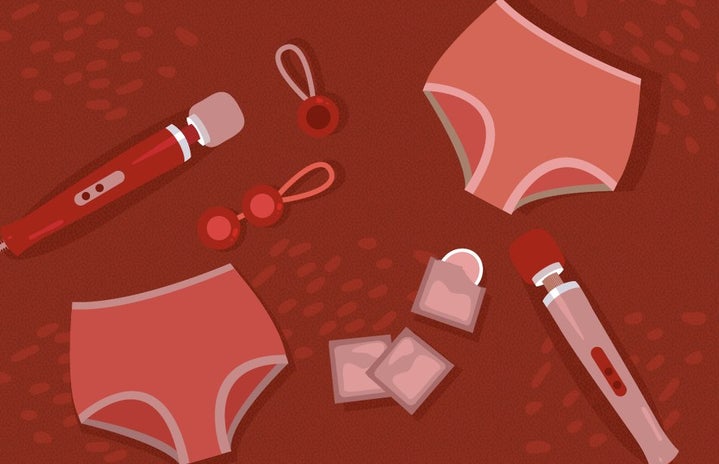The first time I had sex, I didn’t orgasm. But considering it was my first time, and the whole ordeal was awkward and painful, I wasn’t surprised. The second time I had sex, I didn’t orgasm. But both myself and my partner were quite new at the whole “pleasuring” thing and I was more focused on looking sexy than actually enjoying the night. Fast forward to a year later, I am in a committed relationship with a partner I love dearly, and who is handy (in the literal and figurative sense) in bed, and I still haven’t experienced an orgasm. I don’t mean “a man has never given me an orgasm,” I mean I have never had one. Period. So, what the hell was going on? I felt like I had all the right ingredients: a loving (very hot) partner, a comfortable relationship, and 18 years of being told to enjoy my sexual freedom – but I can’t orgasm. Turns out, I’m not the only woman with this issue.
Anorgasmia is an umbrella condition that refers to anyone experiencing delayed, less-intense, infrequent or entirely absent orgasms. Within these experiences are another set of parameters: how long have you experienced anorgasmia. Anorgasmia can be lifelong, defined by someone who has never had an orgasm (woohoo!). It can be acquired, meaning you used to be able to achieve orgasm but no longer can. It can be situational, meaning you can’t achieve orgasm in certain situations (with a certain partner, in a certain place, without certain stimulation etc) or it can be generalized, i.e., you have trouble orgasming in any situation. Anorgasmia can be incredibly distressing to anyone experiencing it, but it might be comforting to know that it’s not uncommon. According to a U.S research study, 10-15% of women have concerns about orgasming and their sexual health.
The causes of anorgasmia vary from physical to psychological issues. Anorgasmia can often be the result of taking certain medications, particularly SSRIs (often used to treat mild depression and anxiety). Anorgasmia can also be caused by certain medical conditions such as diabetes, MS, overactive bladder syndrome or due to invasive surgeries. Psychology also plays a huge role in anorgasmia. People who feel uncomfortable with their partner, are nervous about sex, have anxiety, depression or other big life stressors may experience anorgasmia. It’s a bit of an evil loop, because being anxious about anorgasmia can cause anorgasmia!
When I first discovered the term “anorgasmia” I felt both betrayed by my own body and by the feminism I had come to love. I had grown up surrounded by literature, movies and role models who stressed to me the importance of female pleasure. Gone were the ages where women were taught to just lie still and let their partners have their fun. I was a modern woman, and I had always assumed I was going to enjoy sex. With all the talk of sexual liberation it had never occurred to me that maybe liberation wasn’t so easily achieved. I felt left behind. How could I become the girlboss I always wanted to be if I couldn’t orgasm! It sounds silly, but sexual empowerment has always been a huge part of my view on feminism.
Learning to change my view on female pleasure took a lot of work, and I still get anxious about orgasming sometimes. Nonetheless, I want to share a few important lessons I learned about living with anorgasmia, so other women dealing with the same issue feel less alone:
Remember that sex and masturbation are about pleasure. If either of these activities are pleasurable to you, then keep doing them! Even if you never orgasm as a result, allowing yourself the pleasure without stressing about the results can help you enjoy sexual experiences more.
2) Talk to your partner about it. If you have a partner and are sexually active with them, remember that this affects them too. You shouldn’t feel guilty about being anorgasmic (it’s a medical condition and you can’t help having it. Just like you wouldn’t feel guilty for breaking your leg) but you should be conscious that this part of your life is also a part of theirs. Sometimes partners might worry that they’re doing something wrong, or that you don’t find them sexually attractive. Make sure to sit down and have a conversation about anorgasmia and assure them that they’re still hot af!
3) Don’t be afraid to talk to doctors. While it is important to feel comfortable with having anorgasmia, that doesn’t mean you shouldn’t try and find answers. It can feel embarrassing to talk to a doctor about female sexual health, but it’s important to try and find the root cause of your issue. It may be a medical issue, or might have to do with the medications you take.
4) Therapy is good. If nothing is physically causing anorgasmia, it can be good to talk to a therapist. Sometimes the inability to orgasm is caused by anxiety (related or unrelated to sex itself). Talking to a therapist can help you relax, and maybe you’ll even achieve that big-O one day!
5) Don’t worry. This is the big one, and I know it’s the hardest to follow. But try not to worry too much about it. You are just as much of a girlboss without orgasms. Nobody should make you feel bad for having anorgasmia, least of all yourself. Be kind!

